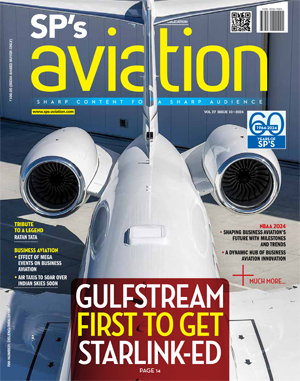INDIAN ARMED FORCES CHIEFS ON OUR RELENTLESS AND FOCUSED PUBLISHING EFFORTS

SP Guide Publications puts forth a well compiled articulation of issues, pursuits and accomplishments of the Indian Army, over the years

"Over the past 60 years, the growth of SP Guide Publications has mirrored the rising stature of Indian Navy. Its well-researched and informative magazines on Defence and Aerospace sector have served to shape an educated opinion of our military personnel, policy makers and the public alike. I wish SP's Publication team continued success, fair winds and following seas in all future endeavour!"

Since, its inception in 1964, SP Guide Publications has consistently demonstrated commitment to high-quality journalism in the aerospace and defence sectors, earning a well-deserved reputation as Asia's largest media house in this domain. I wish SP Guide Publications continued success in its pursuit of excellence.
Defence Industrial Corridors
Real success in the long term will come only if the products of the aerospace industry in the Industrial Corridor measures up to the stringent global standards.

On January 20 this year, the Minister of Defence, Nirmala Sitharaman formally launched the Tamil Nadu Defence Industrial Corridor at Tiruchirappalli. Coming after the first such venture that was launched in August last year in Aligarh, Uttar Pradesh, the Tamil Nadu Defence Industrial Corridor is planned to have six nodes that will be located in the cities of Trichy, Salem, Hosur, Coimbatore, Madurai and Chennai. This is also referred to as the Tamil Nadu Defence Production Quad. This is ostensibly because the six nodal cities mentioned above, form a quadrilateral.
For the Defence Industrial Corridor in Uttar Pradesh launched earlier on, six nodal points have been identified. These will be located in the cities of Agra, Aligarh, Lucknow, Kanpur, Chitrakoot and Jhansi. The intention of the government in setting up these two Defence Industrial Corridors was spelt out in the last Union Budget for the financial year 2018-19. This whole exercise is part of the plan of the government to create an ecosystem within the country for effective indigenous defence production to reduce dependence on foreign sources for military hardware. Not only is this plan meant to strengthen indigenous defence production capability, but even the defence manufacturers all over the world will be able to reduce the price of equipment produced by them by an estimated 20 to 40 per cent if they source components from this newly created defence manufacturing infrastructure in Uttar Pradesh and Tamil Nadu.
With the ‘Make in India’ programme that the NDA government initiated in 2014 soon after coming to power, the stated aim of setting up the two Defence Industrial Corridors is “To transform India into a global design and manufacturing hub”. The whole exercise is intended to be driven by demand in 25 key sectors of the industry of which, manufacture of military hardware was identified as one of the most important segments. The Defence Industrial Corridors would thus be expected to meet with the requirements of the Indian Armed Forces as well as demands of sophisticated military hardware from the global market. With manufacturing for the defence sector expected to be a major commitment, apart from other specialities, the Defence Industrial Corridors will be expected to set up specialised facilities in precision-centred, aero component manufacturing.
In order to ensure that all agencies involved in this exercise are on the same page, there will be exhibitions held to showcase products required by the Indian Armed Forces, the Defence Public Sector Units (DPSUs) and the units under the Defence Research and Development Organisation (DRDO). Items of military hardware that are currently procured from foreign sources at enormous cost and that are planned to be indigenised over the next five years or so, will be displayed at the proposed exhibitions.
Since the NDA government came to power in 2014, it has implemented a number of measures to promote indigenisation in the defence sector. The inclusion of the Indigenous Design, Development and Manufacture (IDDM) category and giving it the top priority in capital acquisition, introduction of the Make Procedure, simplification of the licensing process and modification of the Offset Obligation policy, are some of these steps. Introduction of a Defence Production Policy that is more industry friendly, further refinements in the Offset Obligation policy, simplification of processes of export and import are measures that are also under active consideration and are likely to be implemented in the near future. While these steps are all in the right direction, there is a need for focussed action at the localised level and the need to develop specialised zones dedicated to various facets of defence production.
The initial response from prospective investors to the Tamil Nadu Defence Industrial Corridor has been encouraging. The DPSUs including Bharat Electronics (BEL), Bharat Earth Movers Limited (BEML) Bharat Dynamics Limited (BDL) and the Ordnance Factory Board (OFB) have all come forward with proposals for investments totalling to 3,123 crore. The American aerospace and defence major Lockheed Martin Corporation that has already joined hands with Tata Advanced Systems Limited (TASL) located in Hyderabad has also expressed their intention to invest and engage with the Indian aerospace and defence industry in the Tamil Nadu Defence Industrial Corridor. “We have already engaged with nearly a dozen companies in Chennai and Coimbatore. We have identified seven of these as potential manufacturers of products for the future F-16 fighter aircraft, “said Vivek Lall, Vice President at Lockheed Martin Corporation.
While the progress in the exercise so far of setting up the Tamil Nadu Defence Industrial Corridor appears to be inspiring, real success in the long term will come only if the products of the aerospace industry in the Industrial Corridor measures up to the stringent global standards.





